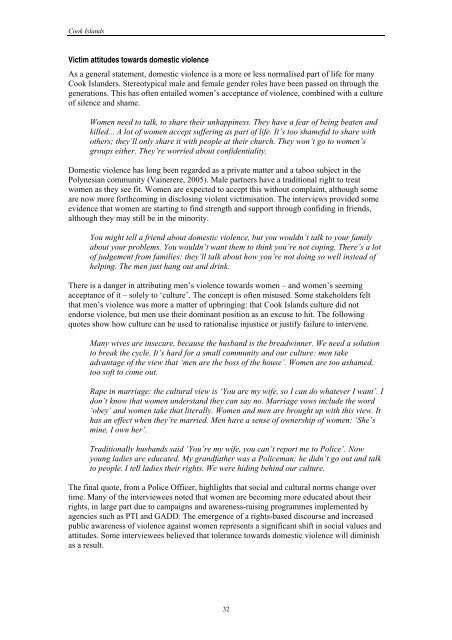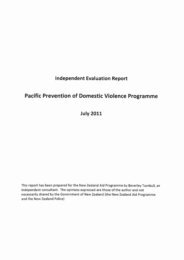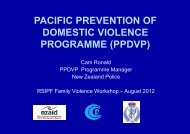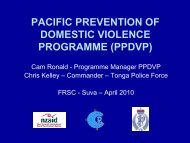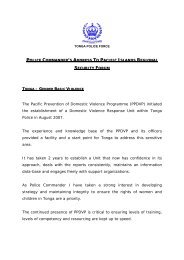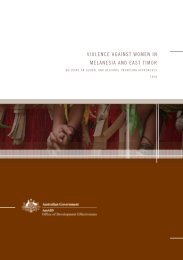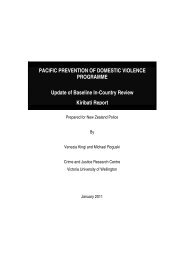Cook Islands - Pacific Prevention of Domestic Violence Programme
Cook Islands - Pacific Prevention of Domestic Violence Programme
Cook Islands - Pacific Prevention of Domestic Violence Programme
You also want an ePaper? Increase the reach of your titles
YUMPU automatically turns print PDFs into web optimized ePapers that Google loves.
<strong>Cook</strong> <strong>Islands</strong><br />
Victim attitudes towards domestic violence<br />
As a general statement, domestic violence is a more or less normalised part <strong>of</strong> life for many<br />
<strong>Cook</strong> Islanders. Stereotypical male and female gender roles have been passed on through the<br />
generations. This has <strong>of</strong>ten entailed women’s acceptance <strong>of</strong> violence, combined with a culture<br />
<strong>of</strong> silence and shame.<br />
Women need to talk, to share their unhappiness. They have a fear <strong>of</strong> being beaten and<br />
killed... A lot <strong>of</strong> women accept suffering as part <strong>of</strong> life. It’s too shameful to share with<br />
others; they’ll only share it with people at their church. They won’t go to women’s<br />
groups either. They’re worried about confidentiality.<br />
<strong>Domestic</strong> violence has long been regarded as a private matter and a taboo subject in the<br />
Polynesian community (Vainerere, 2005). Male partners have a traditional right to treat<br />
women as they see fit. Women are expected to accept this without complaint, although some<br />
are now more forthcoming in disclosing violent victimisation. The interviews provided some<br />
evidence that women are starting to find strength and support through confiding in friends,<br />
although they may still be in the minority.<br />
You might tell a friend about domestic violence, but you wouldn’t talk to your family<br />
about your problems. You wouldn’t want them to think you’re not coping. There’s a lot<br />
<strong>of</strong> judgement from families: they’ll talk about how you’re not doing so well instead <strong>of</strong><br />
helping. The men just hang out and drink.<br />
There is a danger in attributing men’s violence towards women – and women’s seeming<br />
acceptance <strong>of</strong> it – solely to ‘culture’. The concept is <strong>of</strong>ten misused. Some stakeholders felt<br />
that men’s violence was more a matter <strong>of</strong> upbringing: that <strong>Cook</strong> <strong>Islands</strong> culture did not<br />
endorse violence, but men use their dominant position as an excuse to hit. The following<br />
quotes show how culture can be used to rationalise injustice or justify failure to intervene.<br />
Many wives are insecure, because the husband is the breadwinner. We need a solution<br />
to break the cycle. It’s hard for a small community and our culture: men take<br />
advantage <strong>of</strong> the view that ‘men are the boss <strong>of</strong> the house’. Women are too ashamed,<br />
too s<strong>of</strong>t to come out.<br />
Rape in marriage: the cultural view is ‘You are my wife, so I can do whatever I want’. I<br />
don’t know that women understand they can say no. Marriage vows include the word<br />
‘obey’ and women take that literally. Women and men are brought up with this view. It<br />
has an effect when they’re married. Men have a sense <strong>of</strong> ownership <strong>of</strong> women: ‘She’s<br />
mine, I own her’.<br />
Traditionally husbands said ‘You’re my wife, you can’t report me to Police’. Now<br />
young ladies are educated. My grandfather was a Policeman; he didn’t go out and talk<br />
to people. I tell ladies their rights. We were hiding behind our culture.<br />
The final quote, from a Police Officer, highlights that social and cultural norms change over<br />
time. Many <strong>of</strong> the interviewees noted that women are becoming more educated about their<br />
rights, in large part due to campaigns and awareness-raising programmes implemented by<br />
agencies such as PTI and GADD. The emergence <strong>of</strong> a rights-based discourse and increased<br />
public awareness <strong>of</strong> violence against women represents a significant shift in social values and<br />
attitudes. Some interviewees believed that tolerance towards domestic violence will diminish<br />
as a result.<br />
32


